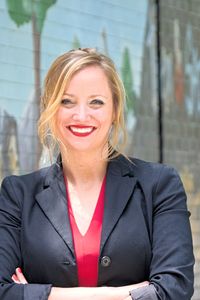Erika Wozniak Francis
Erika Wozniak Francis ran for election to the Chicago City Council to represent Ward 46 in Illinois. Wozniak Francis lost in the general election on February 26, 2019.
Wozniak Francis completed Ballotpedia's Candidate Connection survey in 2019. Click here to read the survey answers.
Francis responded to Ballotpedia's unique candidate survey for 2019 Chicago candidates. The survey questions were developed with input from more than 100 Chicagoans in the months preceding the 2019 election. Here is one selected response:
"The 46th Ward is facing rapid development without maintaining sufficient access to affordable housing. I support the Our Homes Chicago Ordinances package that would ensure that 30% of units in new developments are affordable for current ward residents."
Click here to read more of Francis' responses.
Elections
2019
See also: City elections in Chicago, Illinois (2019)
General runoff election
General runoff election for Chicago City Council Ward 46
Incumbent James Cappleman defeated Marianne Lalonde in the general runoff election for Chicago City Council Ward 46 on April 2, 2019.
Candidate | % | Votes | ||
| ✔ |  | James Cappleman (Nonpartisan) | 50.1 | 7,079 |
 | Marianne Lalonde (Nonpartisan)  | 49.9 | 7,054 | |
| Total votes: 14,133 | ||||
 = candidate completed the Ballotpedia Candidate Connection survey. = candidate completed the Ballotpedia Candidate Connection survey. | ||||
| If you are a candidate and would like to tell readers and voters more about why they should vote for you, complete the Ballotpedia Candidate Connection Survey. | ||||
Do you want a spreadsheet of this type of data? Contact our sales team. | ||||
General election
General election for Chicago City Council Ward 46
The following candidates ran in the general election for Chicago City Council Ward 46 on February 26, 2019.
Candidate | % | Votes | ||
| ✔ |  | James Cappleman (Nonpartisan) | 44.1 | 6,082 |
| ✔ |  | Marianne Lalonde (Nonpartisan)  | 18.1 | 2,494 |
 | Erika Wozniak Francis (Nonpartisan)  | 16.8 | 2,324 | |
Angela Clay (Nonpartisan)  | 15.4 | 2,127 | ||
 | Justin Kreindler (Nonpartisan) | 3.9 | 545 | |
 | Jon-Robert McDowell (Nonpartisan)  | 1.7 | 229 | |
| Total votes: 13,801 | ||||
 = candidate completed the Ballotpedia Candidate Connection survey. = candidate completed the Ballotpedia Candidate Connection survey. | ||||
| If you are a candidate and would like to tell readers and voters more about why they should vote for you, complete the Ballotpedia Candidate Connection Survey. | ||||
Do you want a spreadsheet of this type of data? Contact our sales team. | ||||
Campaign themes
2019
Ballotpedia survey responses
See also: Chicago 2019 Candidate Survey
Erika Wozniak Francis completed Ballotpedia's Chicago candidates survey for 2019. The survey questions appear in bold and are followed by Wozniak Francis' responses.
Low-income families do not have the same choices, options, or alternatives when it comes to public school. How can this be addressed?
Low-income families do not have the same access to quality education through our public schools because our public schools are underfunded and under-resourced. We need to ensure that our public schools are fully funded so that all students can have access to the education that they deserve.
How would you address inequality within and between schools?
I will fight to secure proper funding for our public schools and push for a moratorium on more school closures and on new charter schools opening. We need universal pre-k so more students can enter school with a head start on academics. Underfunding and closing our schools only exacerbates existing inequalities.
How can public schools better support their teachers and work more productively with the teachers’ union, parents, and the community?
Public schools are subject to budgetary instability from CPS leadership and state funding. As alderman, I’ll fight for more resources for our public schools to make sure we have wrap around services for students, and can fully fund teaching positions, social workers, school nurses, after school programs and more.
What do you believe are the greatest needs of kids in school today? How would you prioritize these needs and address them?
Our kids deserve more individualized attention and smaller classroom sizes. Currently, more than 30 kids to a classroom is the CPS standard and anything less is considered underutilized. That is far too many kids per classroom. I will advocate for more equitable funding and resources of CPS to ensure every school has enough staff members and resources to deliver smaller class sizes and more personalized learning environments in order to meet the needs of each unique learner in a class.
What are your proposals for supporting children before and after school? What would be your ideal afterschool programs?
After School Matters is a successful afterschool and summer program that has more applicants than spaces every year, provides a place for artistic expression, job-skill development, and a safe place for teenagers to spend time after the school day is finished. For high schoolers, students are significantly more likely to complete high school, miss school less frequently, and graduate within 4 years. After-School All-Stars (ASAS), a similar program for K-8 students, has shown similar positive results on school attendance and performance. The limited funding of these programs means many schools are not able to provide their students with these programs. Increasing funding and accessibility could have significant impact on our children city-wide.
Do you believe that there is corruption in Chicago politics, such as pay-to-play practices when the city awards bids? If so, how would you address it?
There are absolutely pay-to-play practices at work when the city awards bids. Many of our elected officials rely on large financial contributions from developers and special interest groups for re-election. Our current political system continually reward politicians who do not have their constituents best interest at heart. I will be a independent voice in City Council and I will advocate for change in our electoral system - like small donor matching - to allow for greater representation without reliance on corporate money.
How would you make the city’s policies more responsive to community input instead of donors or special interests?
Not only would I support small donor matching, but I would also advocate for greater community oversight over policies by supporting an elected school board and an elected police accountability board, both of which should have campaign finance restrictions that prevent the disproportionate election of the wealthy or politically connected.
How would you handle the “recurrence of unaddressed racially discriminatory conduct by officers” identified in the U.S. Justice Department’s investigative report of the Chicago PD published in 2017?
I support measures to create community accountability over the CPD and would sponsor the proposed The Community Commission for Public Safety and Accountability advocated for by the Grassroots Alliance for Police Accountability.
What sort of proposals would help reduce police shootings and fatalities?
I support a variety of proposals that will help reduce police shootings and fatalities. I support increasing crisis intervention training, force mitigation training, and implicit bias training. I also want to ensure that our police officers have proper access to mental health services.
What ideas do you have to reduce the availability of illegal or unregistered guns in Chicago?
The majority of seized guns in Chicago have been traced to out of state sales from Indiana, Wisconsin, and Mississippi. I would support Congresswoman Robin Kelly’s efforts to allow national law enforcement agencies to investigate gun trafficking across state lines.
How will you help to rebuild trust in the police department and to encourage the community to work with police?
I would work closely with the 19th and 20th precincts and advocate for a community policing model in which officer would regularly walk an assigned beat. When individual officers keep their assignments, they are able to forge relationships with residents and business owners, increasing trust between the community and the police department.
How would you address criminal justice issues such as prison reform and the reintegration of formerly incarcerated persons into city life?
We need to ensure that our criminal justice system is prioritizing restorative justice. We can lower recidivism by taking note of successful states like Virginia, which credits its low recidivism rates to its comprehensive re-entry programs. These programs include job training, assistance in securing housing and healthcare, and continuing education programs for both the currently and formerly incarcerated.
How would you address the displacement of people of color and long-term residents from their neighborhoods?
The 46th Ward is facing rapid development without maintaining sufficient access to affordable housing. I support the Our Homes Chicago Ordinances package that would ensure that 30% of units in new developments are affordable for current ward residents.
How would you care for the most vulnerable Chicagoans?
I would work to protect the historic SROs present in the Ward to increase access to affordable units. I would fight to prevent further closures of the health clinics present in the ward.
How would you ensure that development benefits residents in their neighborhoods and not solely the developers and other interests?
Ensure that 30% of units in new developments are affordable for residents through support of the Our Homes Chicago ordinances package.
How would you distribute revenue fairly between neighborhoods?
Enact participatory budgeting in order for our community to democratically determine how to use tax increment finance (TIF) dollars in our ward and allow residents to truly have a say in how our public tax dollars are spent.
How do you propose to resolve the city’s underfunded pension plan for city employees?
A pension is a commitment that is depended upon by employees and retirees. We cannot go back on promises made to those who dedicated their careers to civil service – particularly as they cannot rely on social security. Retired public servants also make up a critical component of our middle class communities, and destabilizing their retirements in this way would, in effect, destabilize entire local economies. We must instead seek progressive revenue solutions to fund our pension deficit by ensuring the very wealthy and large corporations are paying their fair share in taxes.
What’s your opinion on tax increment financing (a program that funds development using any additional property tax revenue that results from an increase in appraised property values)? What, if any, changes would you make to the use of TIF?
TIFs are currently being misused in my ward and across the city of Chicago to fund projects that lack community feedback and approval. I support the Back to Basics TIF ordinance that City Council’s Progressive Caucus has introduced, which refocuses the use of TIFs for economic development in blighted areas.
How would you assess the city's finances, and if your proposals would require new spending, how would you pay for them?
I am most in favor of legalizing and taxing recreational marijuana and the LaSalle Street Tax. Until there is a constitutional amendment to allow for progressive taxation, it is essential that legislators work to implement the least regressive taxes available to fund our pensions and debts. Taxing marijuana and the LaSalle Street tax have the most promise to provide significant revenue without hurting working class Chicagoans. I recognize that Chicago’s debt and pension crisis requires that every option for raising revenue be explored, but I will not support measures that continue to disproportionately harm vulnerable Chicagoans.
Would you be in favor of freezing property taxes, at least for low-income households, so that people can stay where they are living?
I support freezing property taxes for low-income households to ensure that working families can continue to live and be a part of their communities.
How would you increase access to quality food and urgent care in all parts of the city?
Having access to quality food and urgent care is a necessity, yet so many Chicagoans continue to go without either. These are critical public health issues and I would work with existing organizations who have already been working on these issue for some time. Growing Home, for example, offers a great unique model for eliminating the city’s food deserts.
How will you address public health concerns such as contaminated drinking water, rat infestation, and lead poisoning?
As alderman, I will advocate to replace all lead service lines to ensure that our drinking water is clean and safe. I will also work to ensure that Chicago’s chronic rat infestation problem is addressed by working with Chicago’s Department of Streets and Sanitation to properly dispose of garbage without allowing it to be used as a food source for rats.
How would you make Chicago a cleaner city with less waste and pollution?
I will support the broader goal of establishing investment policy that mandates investment in ESG (environmentally responsible, sustainable and good governance practices) compliant investments and committing to move the City to 100% clean energy sources by 2030. I will advocate for the ban of coal tar sealants from being sold or used in Chicago. This ban will help prevent dust from coal tar, a known human carcinogen, from polluting our air and being tracked into our homes. I will join the fight to demand a full audit of the City’s recycling and waste management programs, and advocate for smart solutions to improve our waste reclamation rates. Today, the City’s recycling program falls far short of where it should be, and aldermen lack the data they need to evaluate it effectively.
Note: Ballotpedia reserves the right to edit Candidate Connection survey responses. Any edits made by Ballotpedia will be clearly marked with [brackets] for the public. If the candidate disagrees with an edit, he or she may request the full removal of the survey response from Ballotpedia.org. Ballotpedia does not edit or correct typographical errors unless the candidate's campaign requests it.
See also
2019 Elections
External links
Footnotes
| |||||||||









